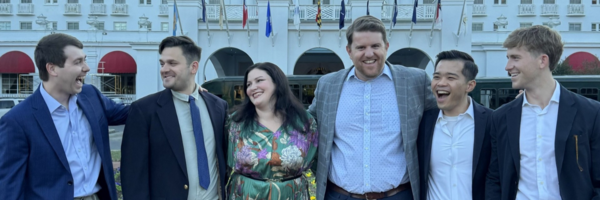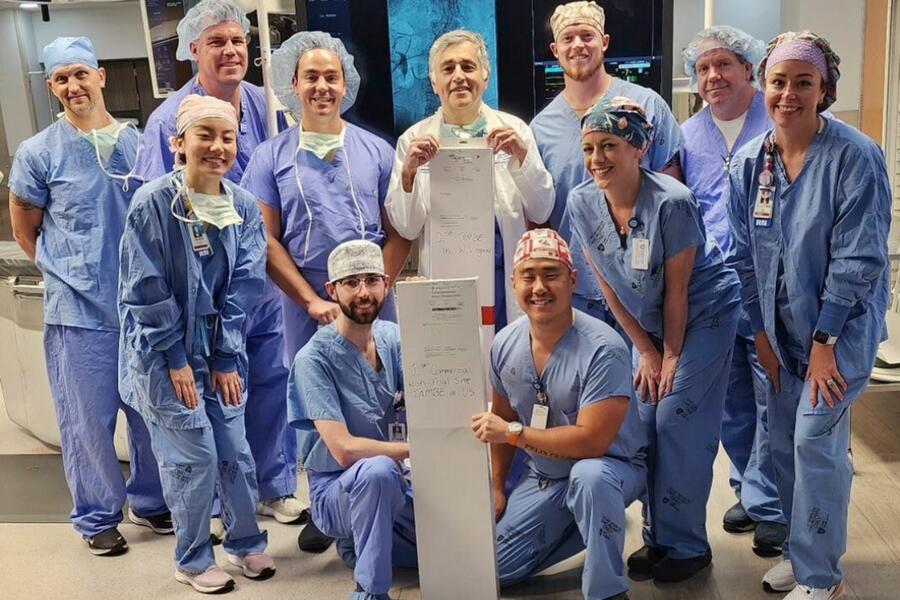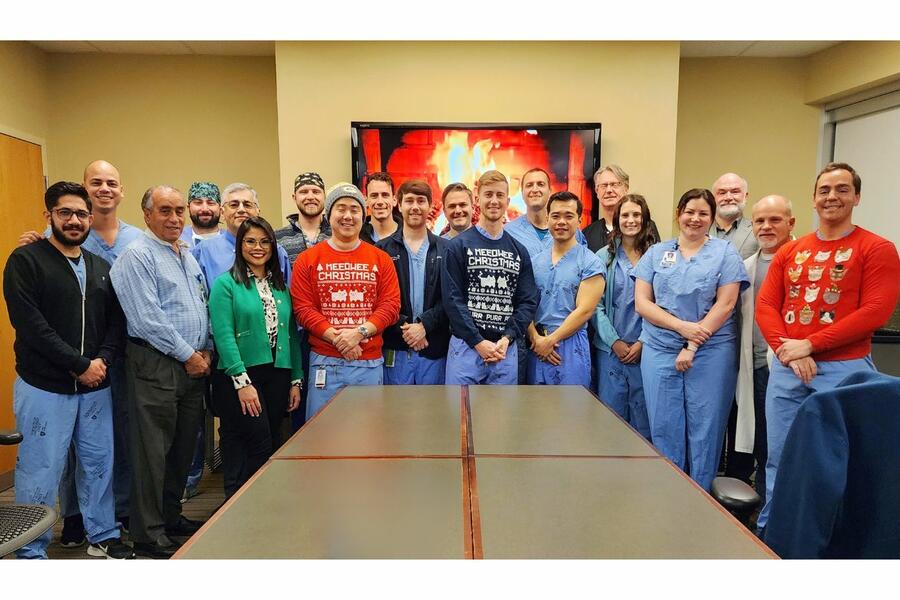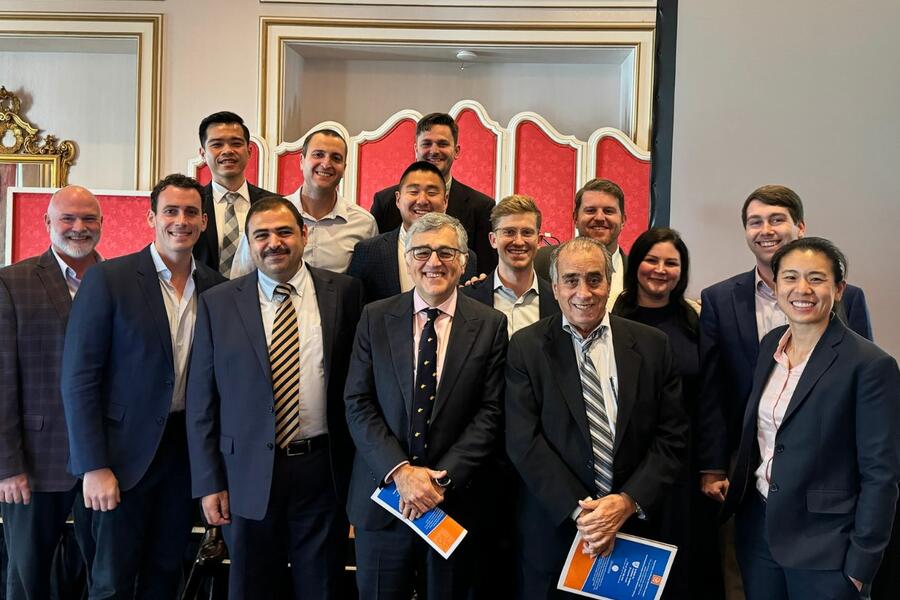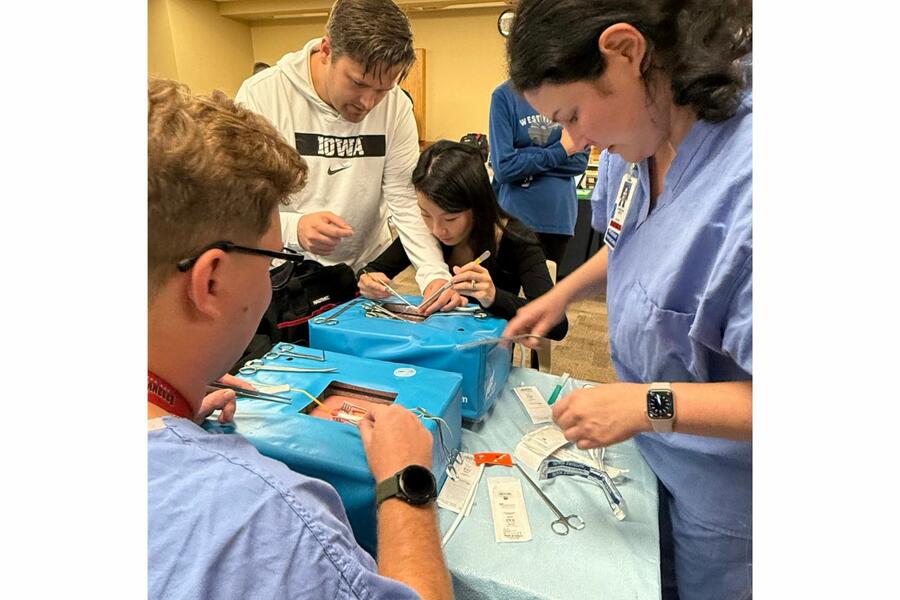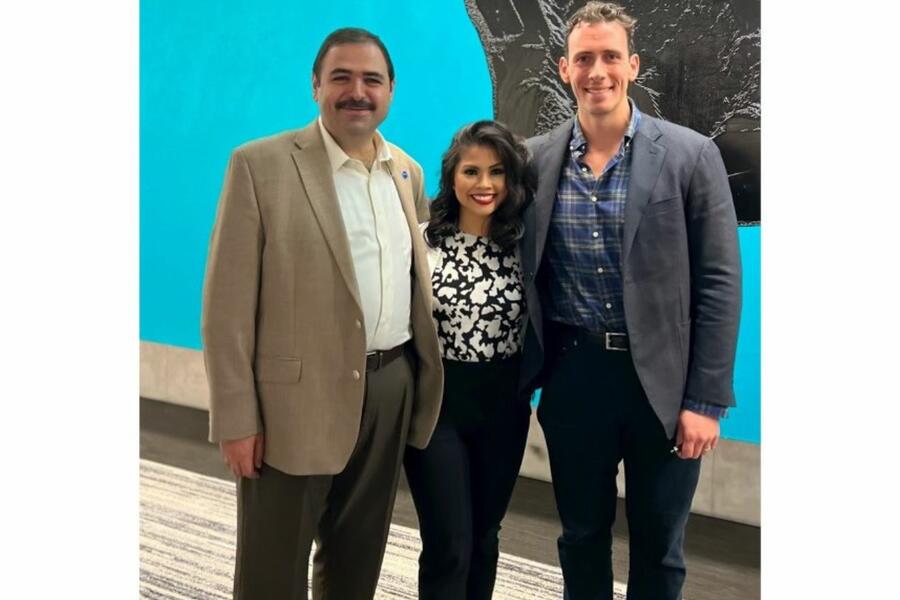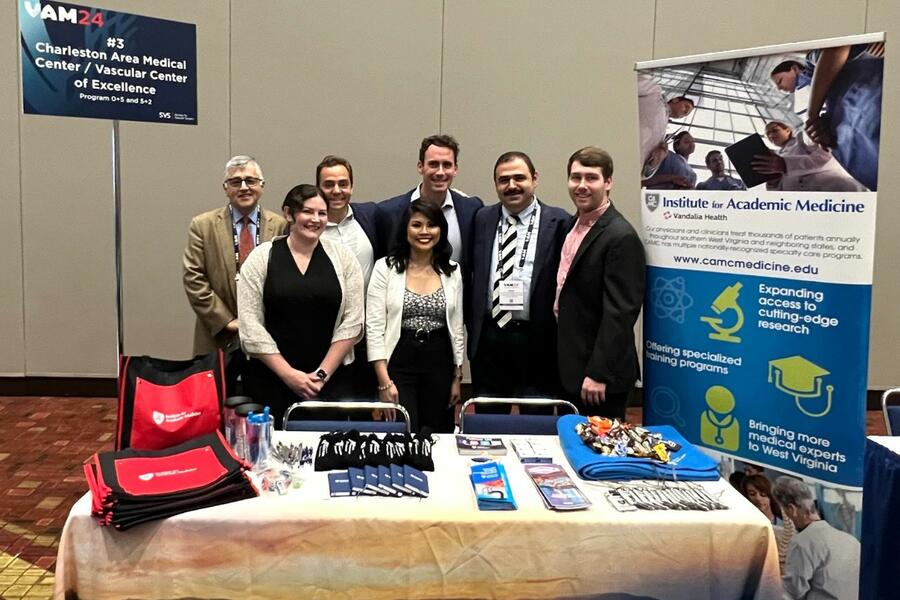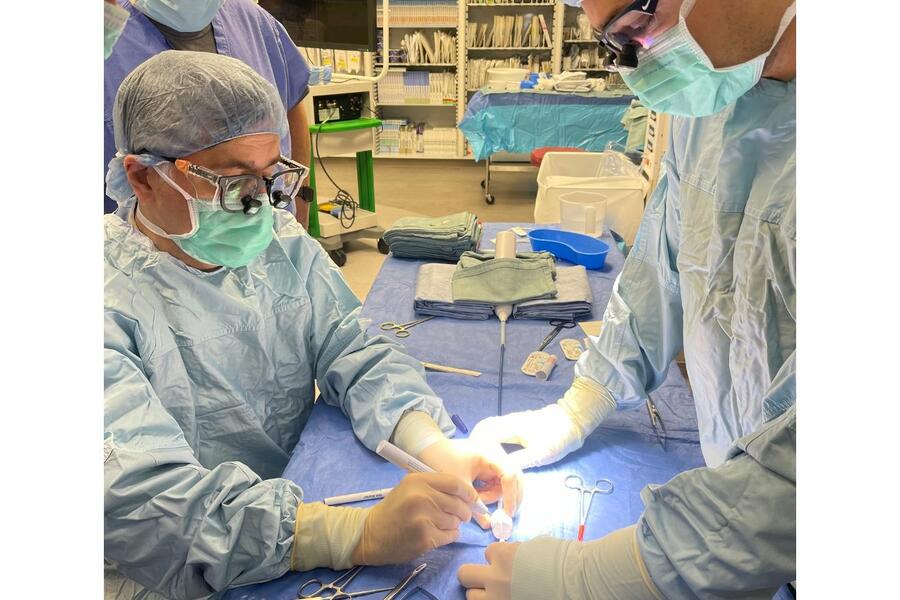Vandalia Health Charleston Area Medical Center is accredited by the Accreditation Council for Graduate Medical Education as a sponsoring institution of graduate medical education residency and fellowship programs. The goal of CAMC Vascular Surgery Residency and Fellowship programs is to develop our trainees into expert clinicians who are both clinically and academically proficient in all aspects of the diagnosis, management and treatment of vascular disease.
Both the two-year fellowship and the 0-5-year residency training experiences offer outstanding opportunities for graduating general surgery residents and medical students to learn the art of vascular and endovascular surgery.
Comprehensive Clinical Training
Under the instruction of our enthusiastic and committed faculty, our vascular trainees will ultimately demonstrate competent surgical judgment and operative skills, preparing them for independent practice in vascular surgery.
Fellows will primarily rotate through three services, allowing for thorough and progressive training in acute care, open vascular and endovascular intervention. They will also spend time working in our accredited vascular laboratory.
Residents in the 0-5 integrated program will spend 18 months of their first two years (PGL1 - PGL 2) within the Surgery department in monthly rotations that will supplement the vascular trainees' experience and build the necessary foundations for surgery. These rotations include cardiothoracic surgery, plastic surgery, trauma, general elective surgery and the general surgery acute care service, just to name a few. During the last three years of their training (PGL 3 - PGL 5), residents will rotate solely through the Vascular Surgery department's services.
Trainees will spend their time with the full-time vascular surgeons while learning to master open vascular surgical techniques and provide exemplary patient care. The open vascular rotations experience an extremely high volume annually:
- 200+ carotid endarterectomies
- 20+ supra-aortic trunk reconstructions (extra-anatomic or intrathoracic repair)
- 20+ complex aortic interventions (including suprarenal and thoracoabdominal aortic aneurysm)
- 150 - 200 infra-inguinal reconstructions
- 200+ vascular access operations
- Venous ablation (radiofrequency or laser)
- Complex vascular trauma
Trainees will spend time within four vascular-dedicated catheterization labs housed in our notorious Circulatory Dynamics Laboratory (CDL). This rotation will afford trainees the opportunity to participate in a wide variety and high volume of cases annually:
- 50 carotid stents
- 200 renal/visceral stents
- 100+ EVARs
- 25+ TEVARs
- 500+ peripheral interventions
- 100 complex venous interventions
- 20 branched/fenestrated grafts
- Vascular trauma
- Visceral embolizations (GI bleeds, traumatic hemorrhage)
- Cerebral imaging
- Catheter-directed therapy for pulmonary embolism
- Comprehensive dialysis interventions
Our residents and fellows will spend time in our Vascular Lab under the instruction of Medical Director Ali F. AbuRahma, MD. Here, they will gain exposure to various noninvasive vascular techniques, including duplex ultrasound, physiological testing, segmental Doppler pressure with ankle/brachial indices, pulse volume tracings and various plethysmography techniques. Our vascular lab is an IAC-accredited lab, employs 15 vascular lab technicians (RVT) and has a volume of more than 2,000 studies per month, making it the busiest lab in the Mid-Atlantic region.
In addition to technical instruction, trainees will receive instruction in vascular image interpretation from our RPVI-certified vascular surgeons. Before completing their final year, fellows are expected to successfully complete the RPVI credentialing.
In keeping with the program’s commitment to excellent patient care and medical knowledge, as well as the continuity of care, vascular fellows and residents will spend at least one half day per week in the outpatient setting. Here they will attain knowledge of preoperative planning and postoperative assessment. The Vascular Center of Excellence has more than 8,000 outpatient visits per year and over 2,500 new referrals annually, giving trainees ample opportunity to experience patient care in the outpatient setting.
The weekly vascular conference series is the cornerstone of the formal education aspects of the program. The conference is composed of the topics outlined in the APDVS approved training curriculum. The majority of these topics are presented by the vascular faculty; fellows and residents will be required to present topics as well.
Journal Club occurs monthly and consists of journal articles selected by the faculty. Each month, two trainees will be assigned an article and will each present the purpose and methods of the study. A review of the results will follow, along with a discussion on the study, critique of its methods and results.
This meeting is held bi-monthly following the didactic conference. Trainees are assigned to present case synopses for which they were involved in patient care; they investigate and evaluate the care they have given to the patients, appraise and assimilate scientific evidence and use current literature to identify areas of improvement. Cases are presented to surgical residents, fellows, and attending staff.
Research Opportunities
The Vascular programs are highly dedicated to academic research and provide their trainees with ample opportunity to develop a similar dedication to research. The faculty has produced 600 peer-reviewed publications, and Vascular fellows are required to participate in at least two research projects for publication during training. Residents are required to participate in at least three.
The vascular faculty also continuously conducts multiple industry-supported prospective and retrospective research trials as well as investigator-initiated trials.
Additional Training Opportunities
In addition to the didactic lecture circuit, each trainee will be offered multiple opportunities to attend outside conferences and training sessions. Most are industry-sponsored and include training on IVC filters, AV access techniques, and endovascular stent graft courses. Active membership in national and regional organizations such as the Society for Vascular Surgery (SVS), Southern Association for Vascular Surgery (SAVS), Society of Clinical Vascular Surgery (SCVS) and Eastern Vascular Society (EVS) is offered for each trainee. Participation in each of these organizations allows us the opportunity to pursue further training from programs offered by these organizations.
Salary and Benefits
CAMC offers a comprehensive salary and benefit package for residents and fellows.
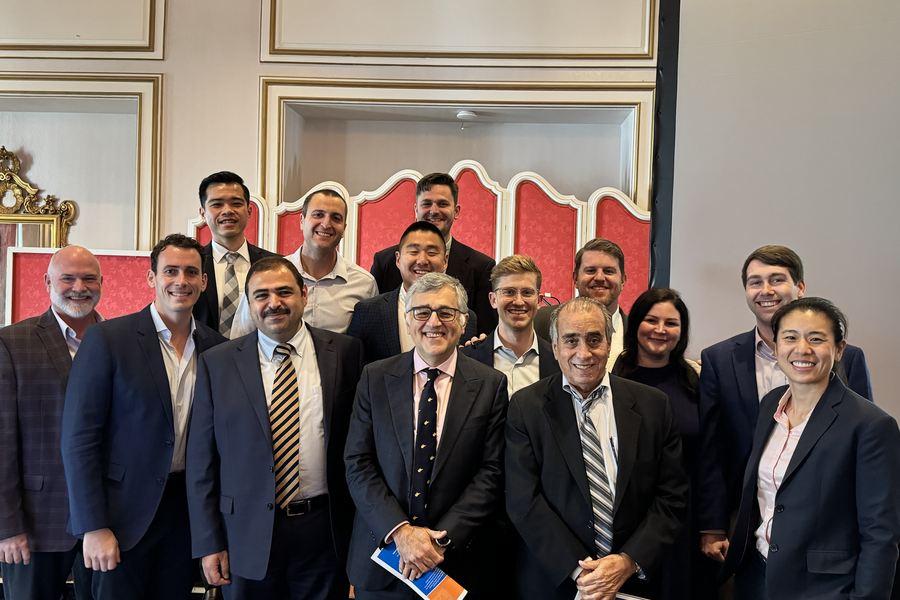
Our Team
Pictured Left to Right: James Campbell, MD, Zachary AbuRahma, DO, RPVI, Suy Sen Hung Fong, MD, Shadi Abu-Halimah, MD, FACS, Matthew Beasley, DO, RPVI, Mohammad Eslami, MD, MPH, FACS, FACC, Andrew Lee, MD, RPVI, Noah Dargy, MD, Samuel Booth, MD, Ali AbuRahma, MD, Kory Dees, MD, Christina Veith, DO, Robert Cragon, MD, and Catherine Go, MD
Explore Charleston and West Virginia
Charleston is a small city with a metropolitan culture, and is close to some of the best outdoor recreation in the country.
Prospective Residents & Fellows
Explore key resources as you consider joining our community of learners and leaders in graduate medical education.

